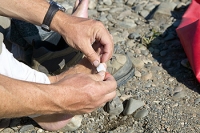If you see a small area filled with clear fluid on your foot, you may have what is referred to as blister. It’s common for joggers to develop blisters on the feet, and their running is often compromised. Pain and discomfort are often associated with blisters, and the best way to avoid this condition from occurring is to be aware of how to prevent it. It’s important to wear running shoes that fit correctly, and this includes choosing a shoe size that is bigger than shoes that are worn while not running. Additionally, there are socks that are designed specifically for running, and blisters may not form as rapidly when worn. Typically, the best way to treat a blister is to leave it alone, and it will heal on its own. If it bursts and becomes infected, a bandage may be necessary to cover it for protection. Please schedule a consultation with a podiatrist if you would like information about blisters on the feet and how to treat them.
Blisters are prone to making everyday activities extremely uncomfortable. If your feet are hurting, contact Dr. Kenneth Donovan of Advanced Care Foot and Ankle. Our doctor can provide the care you need to keep you pain-free and on your feet.
Foot Blisters
Foot blisters develop as a result of constantly wearing tight or ill-fitting footwear. This happens due to the constant rubbing from the shoe, which can often lead to pain.
What Are Foot Blisters?
A foot blister is a small fluid-filled pocket that forms on the upper-most layer of the skin. Blisters are filled with clear fluid and can lead to blood drainage or pus if the area becomes infected.
How Do Blisters Form?
Blisters on the feet are often the result of constant friction of skin and material, usually by shoe rubbing. Walking in sandals, boots, or shoes that don’t fit properly for long periods of time can result in a blister. Having consistent foot moisture and humidity can easily lead to blister formation.
Prevention & Treatment
It is important to properly care for the affected area in order to prevent infection and ease the pain. Do not lance the blister and use a Band-Aid to provide pain relief. Also, be sure to keep your feet dry and wear proper fitting shoes. If you see blood or pus in a blister, seek assistance from a podiatrist.
If you have any questions, please feel free to contact one of our offices located in Warren, Livingston, and Toms River, NJ. We offer the newest diagnostic and treatment technologies for all your foot care needs.

